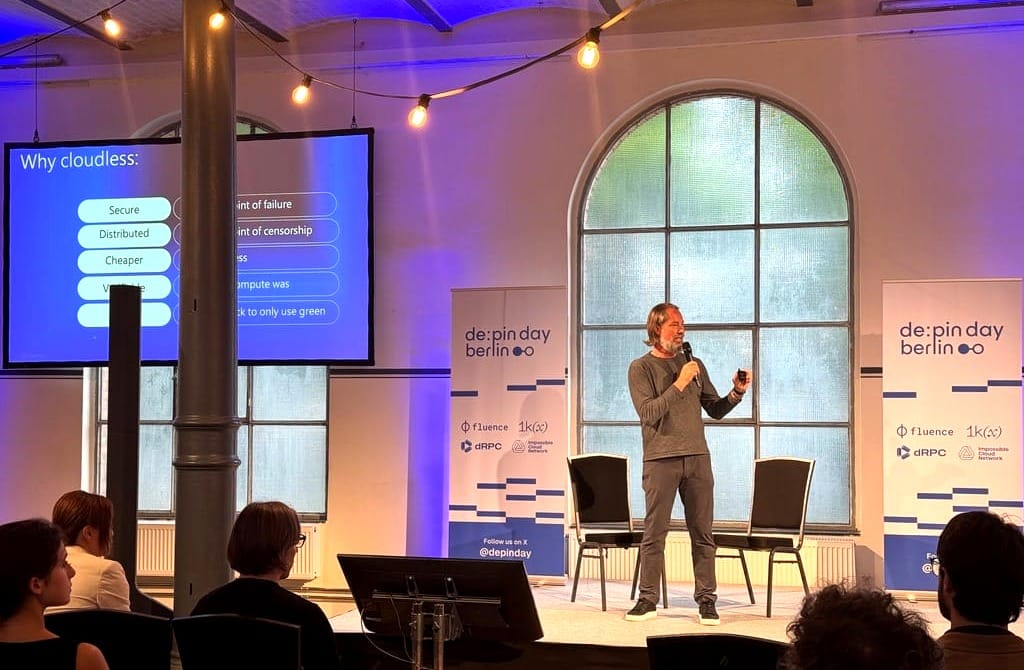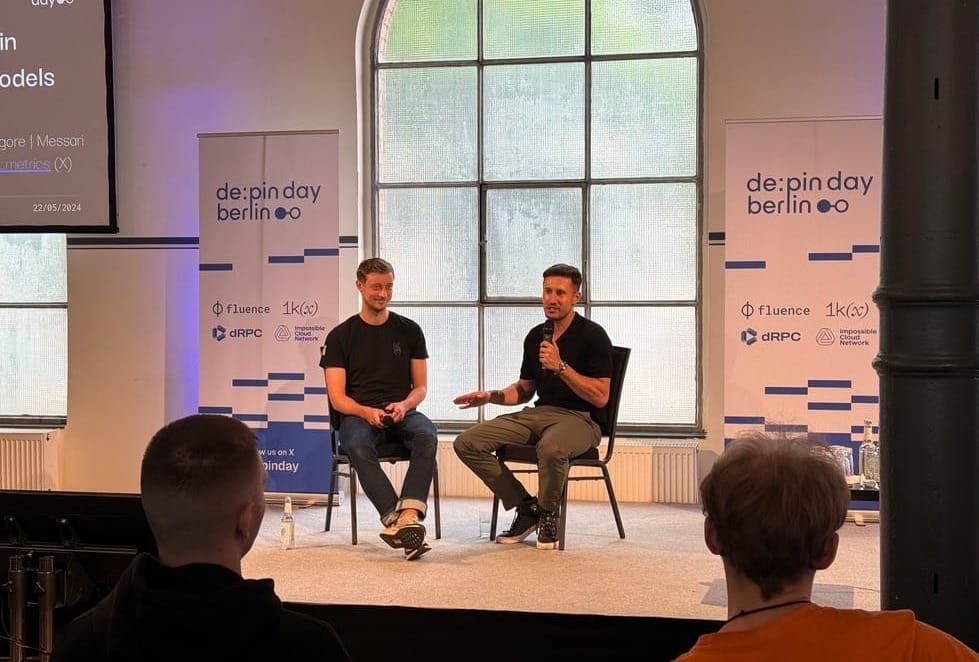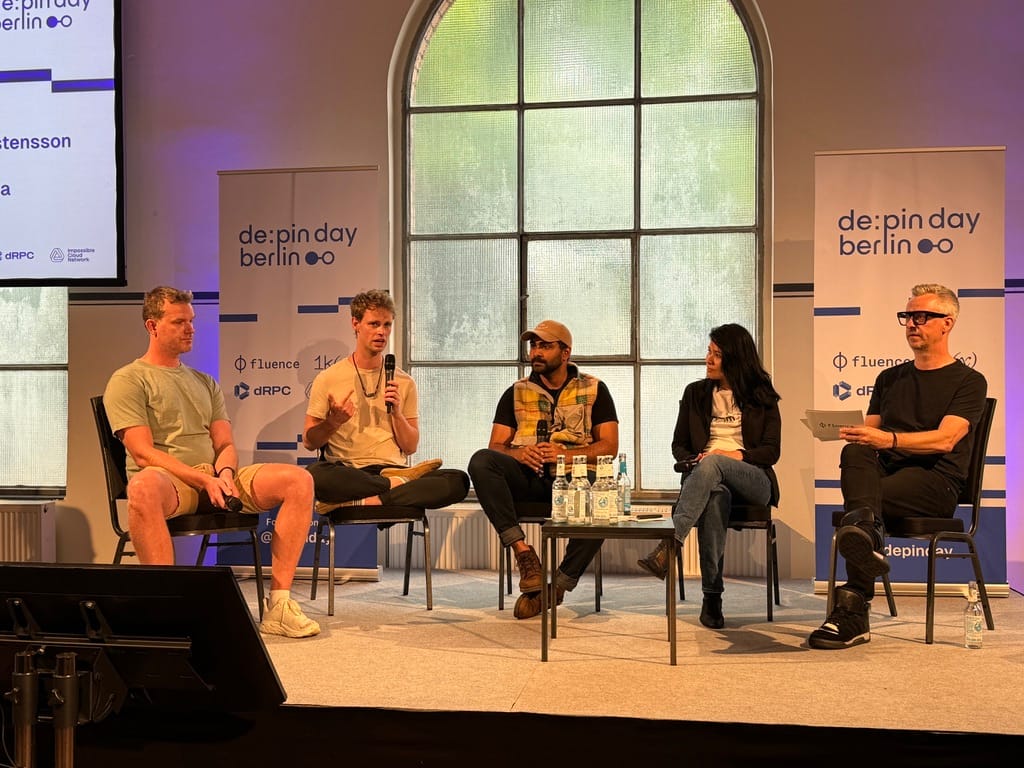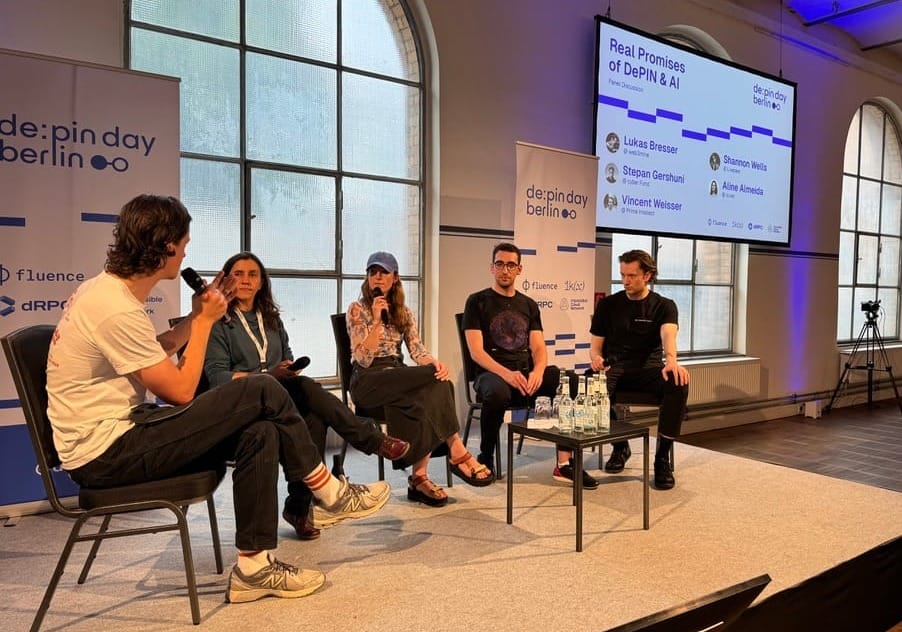Co-Creating the Future of DePIN ~ DePIN Day Berlin 2024 Summary

Beginning at our launch at ETH Denver in March 2024, Fluence team (shoutout to the events lead Nadia Venzhina) has been producing and hosting DePIN Days - a series of events dedicated to exploring the forefront of research and development in Decentralized Physical Infrastructure Networks. Our goal is to gather together DePIN leaders, developers, researchers and enthusiasts in different locations all around the world.
A recent well-attended event, featuring lots of interesting knowledge exchange, took place during the Berlin Blockchain Week in May. We co-hosted it in partnership with collaborators from 1kx, Impossible Cloud and dRPC. Read on to find out more.
📌 Architecting a Sustainable DePIN Network
The day-long event kicked off with Fluence co-founder Tom Trowbridge walking us through the various elements required to architect a sustainable DePIN network, which are also instrumental to and exemplified by the Fluence network architecture. True decentralized compute is fault tolerant and verifiable, thanks to which the network is always on, global and self-healing from downtime and interruptions, explained Tom. What makes Fluence special is real-time fault tolerance and failover built into the network, verifiability and auditability of compute, as well as ensuring 80% lower cost than the centralized cloud compute provision.
Subsequently, Tom elaborated on the benefits of cloudless computing, which include verifiability, censorship resistance, low cost and possibility to host applications freely, without being subject to any limitations around, for example, centralized platforms upgrade cycles. Fluence has built an analogy to the cloud stack with different software layers in order to truly compete with the cloud, with more tooling being released on a regular basis. Watch the full presentation here.

📌 Value Creation & Value Capture in DePINs
In the following fireside chat, Robert Koschig from 1kx and Mihai Grigore, director of research at Messari, discussed the intricacies of value capture in DePIN networks. Focusing on the specific roles and efficiencies within these systems, both researchers highlighted how entities such as service nodes, validators, and gateways capture value — whilst analyzing the dynamics of cost reduction and monetization. Diving into a specific case study referencing Pocket Network, the discussion details its transition from free-tier services to a more sustainable, fee-based model. The conversation wrapped up with strategies for network profitability, focusing on efficient cost management and strategic scaling. Watch the fireside chat here.

📌 DePIN Restaking
Vuk Vukjoje, founder of web3mine - an innovation lab which helps collectively coordinate hardware and capital, introduced us to DePIN Restaking. In the context of Ethereum, staking allows protocols to build on the same services while sharing the same resources. The networks are not paying for the security of the networks themselves, while being able to secure and scale block space for their actively validated services, explained Vuk. In the context of DePIN, similar dynamics occur while the storage or computing jobs need to be executed. What stakers care about is maximizing yield by locking liquidity with providers, while protocols want to reduce the costs of running infrastructure. To address this and accelerate transition to DePIN, web3mine coordinates capital and hardware from the providers. Watch the full presentation here.
📌Addressing Trustlessness and Data Exchange
The following panel featured Paksy Plackis-Cheng (Staex) Matthew Fontana (Streamr Network), Joel Thorstensson (3Box Labs/ Ceramic) and Raghav Rmadya (Reppo), who sat down to discuss trustlessness and data exchange within DePIN ecosystems. DePINs change the game in data exchange by offering creators and users of large data sets decentralized physical infrastructure networks to manage ownership, sovereignty, usage and incentivization across various industries. The panelists stressed the importance of community building within DePIN network context. With DePIN, community is the infrastructure, it is the project, explained Matthew Fontana. If we don't have the industry and government embrace some of the things we're doing, we'll never achieve mass adoption. That's why I'd really like to drive forward the importance of community building and collaboration within the ecosystem, added Paksy Plackis-Cheng.
Watch the entire panel here.

📌 Next Generation Decentralized Cloud & DePIN
Kai Wawrzinek, co-founder of Impossible Cloud Network walked us through the evolution of DePIN - from blockchain inception with Bitcoin and decentralised ledgers, through supply and bootstrapping hardware focused projects such as Filecoin or Akash, to demand-side focused projects. We’re at the brink of phase IV - truly challenging the global cloud incumbents - AWS, Google or Microsoft, explained Kai. As customers expectations are very high, multi-service architecture and enterprise-level hardware are crucial for customers to switch from the current products to DePIN networks. Web3 needs to develop into a holistic multi-service cloud offering, in a decentralised way, in order to achieve mass adoption of the DePIN ecosystem - explained Kai. Watch the full presentation here.
📌 Strategies for Equitable Work Distribution in Protocol
In his talk, Playing it Fair, Viacheslav Shebanov, CTO of dRPC.org addressed the challenge of equitable work distribution within protocols. What is fair in this context is sending requests to providers or participants in the networks who can perform the tasks - and while this sounds simple, it’s a real challenge, explained Slava, and walked us through the details of how dRPC intelligent rating system for providers, optimizing latency and reliabilities of their services. Watch the entire talk here.
📌 Building Human Driven Data Economy with Small Language Models
Nick Havryliak, co-founder of Assisterr, introduced his approach to enhancing AI support within Web3 protocols through small language models (SLMs). He discussed how Assisterr automates tech documentation, reducing cost significantly. Addressing the inefficiencies of large language models, Havryliak emphasized the value of community-generated data to achieve high accuracy in language models — and proposes a decentralized data provenance protocol. This protocol incentivizes contributions and ensures fair rewards for participating data suppliers, aiming to revolutionize the AI data market and enable the advancement of community-led models. Watch the entire presentation here.
📌 Real Promises of DePIN & AI

AI tokens and AI infrastructure saw a huge run up earlier this year, with Artificial Intelligence (AI) digital assets market cap reaching $32.93B. The collision of Web3 services, distributed infrastructure (DePIN) and AI creates entirely new forms of internet experience and we're just starting to see the future - but it’s important to see beyond the hype, and have clarity on which AI use cases are decentralized networks superior to centralized setups. The last, but not certainly not least panel discussion, titled Real Promises of DePIN And AI, featured technologists and experts Stepan Gershuni (cyber•Fund), Vincent Weisser (Prime Intellect), Shannon Wells (Livepeer) and Aline Almeida (io.net), and was moderated by Lukas Bresser (web3mine).
We begun with the question on how their projects create real value for the future of the AI ecosystem. Crypto is well-positioned to drive down the cost of capital and the efficiency of compute as an asset class - that’s good for bringing compute and AI models and other compute-adjacent assets on chain, and figuring out novel funding models for people to get compute. There’s a lot of opportunities for the space - said Vincent Weisser. Aline Almeida, SVP of Engineering at io.net, emphasised the importance of being realistic in terms of the type of demand for AI we can address in the decentralised manner. The training model is a harder task considering the decentralised nature of the network, inference is an easier task - she explained.
Livepeer is very focused on a very specific use case - video and video workflow. We are trying to understand what internet and consumer applications are being built with generative AI, and what inference tasks are adding value around video workflows, explained Shannon Wells.
Later on the discussion shifted to addressing governance and coordination, the hardest problems in Web 3.0. In 5-10 years we will use AI assistants to organise everything, and the existing coordination system is not fit for this digital future. AI is very capital intensive, and the organisations who own compute and train the models will be able to influence what these models are doing, explained Stepan Gershuni. Crypto space is like an onchain sandbox system for novel approaches to governance. We can apply scientific methods to governance and coordination before scaling it globally, and that’s very valuable in itself, he added.
Watch the entire panel discussion here.
We hope you enjoyed this recap of some of the important themes in the DePIN ecosystem, and learned a lot about DePIN futures from our speakers and panelists. We'd like to thank all our partners who made this event possible - 1kx, Impossible Cloud and dRPC, as well as all speakers and participants!
We hope to see you at the next event during ETH Brussels on July 10th. Register here and follow DePIN Day on Twitter.

